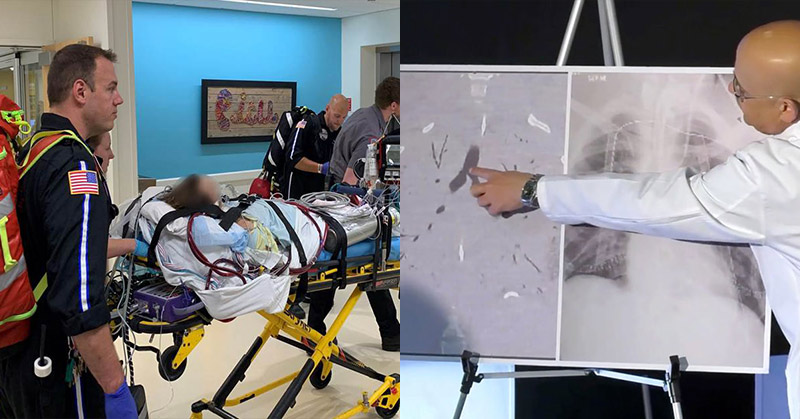The problems with vaping do not start and end with the explosion of the vaping devices which, while rare, have led to serious and fatal injuries [1]. As many know, thousands of vapers have been affected by vaping related illnesses or what is now known as EVALI (e-cigarette, or vaping, product use associated lung injury). As of November 5th, the CDC has reported 2051 cases of EVALI from around the country [2]. Some new evidence has pointed towards the vitamin E acetate being used in vaping products as being the culprit [2], however, there are still people being affected.
A 17-year-old teenager from Michigan (name withheld) could be the first person to receive a double lung transplant after both lungs were severely damaged from regular vaping [3].
The teen had been a few weeks shy of his 17th birthday when he was taken to the Ascension St. John Hospital in Detroit with suspected Pneumonia. From the Children’s Hospital of Michigan, he was taken to Henry Ford hospital where the doctors had to perform a double lung transplant on him, making him the first person to receive such a procedure from damage caused by vaping.
According to Dr. Hassan Nemeh, director of thoracic organ transplant at Henry Ford, there was an “enormous amount of inflammation and scarring” on his lungs and the only option was to have them removed entirely.
“This is an evil I haven’t faced before,” Dr. Nemeh said. “The damage that these vapes do to people’s lungs is irreversible. Please think of that — and tell your children to think of that.”
Vaping could potentially cause more harm than traditional cigarettes
The doctors declined to give the name of the e-cigarette brand or liquid the boy had been vaping. They are cautioning everyone to abstain completely from vaping, no matter the brand.
“Stop vaping, whatever it is — just stop. We beg of you,” said Dr. Nicholas Yeldo, a critical care physician at Henry Ford. “We don’t want to be taking care of you next.”
Before the transplant, the boy as unable to breathe on his own. He was hooked up to an Extracorporeal Membrane Oxygenation (ECMO) machine (respiratory support when the heart and lungs fail) while the doctors determined the next course of action. A single lung transplant wouldn’t have been feasible. Both lungs were so terribly damaged that he couldn’t have been taken off the ECMO for more than a few minutes while he was transported from the ambulance to Henry Ford.
According to Dr. Nemeh, the boy would have “faced certain death” if his lungs hadn’t been transplanted.
An Arduous Recovery Ahead
Most people who require double lung transplants usually suffer from obstructive pulmonary diseases or pulmonary fibrosis. They have an average survival period of seven years following the procedure, but no one has ever received a DLT from vape-damaged lungs before. The doctors are fairly certain that with his youth and progress, he could have a longer, healthier life.
Despite this, he would have to spend a long time in rehab before he’s fit to return to his normal life.
“We are forever grateful to the organ donor and their compassionate family for making the selfless decision to donate the gift of life,” the boy’s family said. They permitted the hospital to release their statement on his case to create awareness on the dangers of vaping.
“We asked Henry Ford doctors to share that the horrific life-threatening effects of vaping are very real!” the statement read. “Our family could never have imagined being at the center of the largest adolescent public health crisis to face our country in decades.”
“Within a very short period of time, our lives have been forever changed. He has gone from the typical life of a perfectly healthy 16-year old athlete — attending high school, hanging out with friends, sailing and playing video games — to waking up intubated and with two new lungs, facing a long and painful recovery process as he struggles to regain his strength and mobility, which has been severely impacted.”
EVALI is Becoming an Endemic
The Center for Disease Control (CDC) has identified a chemical compound called vitamin E acetate as a “very strong culprit” causing the vaping-related lung disease [2]. As mentioned EVALI has affected more than 2,000 Americans since March, but it has lead to the death of nearly 40 of them. Teenagers and young adults account for a great number of them.
“Vaping-related injuries are all too common these days. Our adolescents are faced with a crisis,” said Dr. Lisa Allenspach, director of Henry Ford’s Lung Transplant Program. “We are just beginning to see the enormous health consequence jeopardizing the youth in our country … these vaping products should not be used in any fashion.”
According to the CDC, vitamin E acetate is a sticky oil used to thicken THC vape liquids. It was found in the lung fluid samples of 29 patients diagnosed with EVALI. Over 200 THC product samples tested by the FDA contained this chemical.
“Vitamin E acetate is enormously sticky,” Dr. Jim Pirkle of the CDC’s environmental health lab. “You can think of it to be just like honey. And so when it goes into the lung, it does hang around.”
According to Dr. Anne Schuchat, the CDC’s principal deputy director, the discovery of vitamin E acetate as a major culprit does not mean it is the only culprit involved [4]. Several other chemicals used in making e-cig liquids (propylene glycol, glycerin, nicotine, flavorings, additives, contaminants) could just as bad or possibly worse.
“Previous non-CDC research suggests that when vitamin E acetate is inhaled, it may interfere with normal lung function,” Schuchat said. “Until the relationship between vitamin E acetate and lung health is better characterized, it’s important that vitamin E acetate not be added to e-cigarette or vaping products. Caution should be used before substituting other cutting agents or additives for vitamin E acetate.”
Two Evil Sides of the Same Coin
Teenagers are vaping more than any other age group even though the legal age to own an e-cigarette is 18. However, most online stores do not ask for age proofs and vaping is on the rise. Most teens who vape are more interested in the flavors and can easily become addicted to the nicotine [5]. Many parents sign off – wrongly so – on vaping on the grounds that the children do not smoke marijuana or tobacco.
Although more research is needed on the subject, Vaping and JUULing are as safe of an alternative as they were once thought to be. These things have progressively become more harmful and addictive and could cause serious harm within a shorter term than tobacco cigarettes normally would [6]. Neither is better or safer than the other at this time, so it’s recommended to take the time to consider what they’re putting in their bodies and for them, (and all of us) to abstain from vaping.
- Jordan Nisbet. Another man dies after vape pen explodes, severing an artery in his throat. The Hearty Soul. https://theheartysoul.com/another-man-dies-after-vape-pen-explodes-severing-an-artery-in-his-throat/. Retrieved 12-11-19
- CDC. Outbreak of Lung Injury Associated with the Use of E-Cigarette, or Vaping, Products. CDC.gov https://www.cdc.gov/tobacco/basic_information/e-cigarettes/severe-lung-disease.html. Retrieved 12-11-19
- Erika Edwards. Michigan teen needed new lungs because of vaping. NBC News. https://www.nbcnews.com/health/vaping/michigan-teen-needed-new-lungs-because-vaping-n1080666?cid=sm_npd_nn_fb_ma. Retrieved 12-11-19
- Hilary Brueck, Business Insider. CDC Identifies ‘Sticky’ Chemical Tied to Deadly Vaping Illness in Patients’ Lungs. Science Alert. https://www.sciencealert.com/the-cdc-have-finally-detected-the-potential-vaping-illness-culprit-in-lung-samples. Retrieved 12-11-19
- Admin. Fruit, candy, menthol flavors make e-cigarettes more attractive to teens, research finds. RTI International. https://www.rti.org/news/fruit-candy-menthol-flavors-make-e-cigarettes-more-attractive-teens-research-finds. Retrieved 12-11-19
- Admin. Is Vaping Better Than Smoking? Heart.org https://www.heart.org/en/healthy-living/healthy-lifestyle/quit-smoking-tobacco/is-vaping-safer-than-smoking. Retrieved 12-11-19

